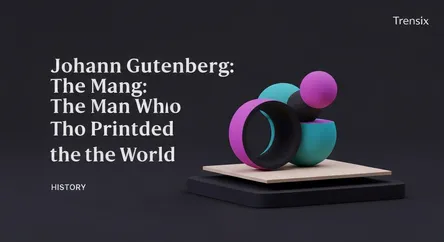History
Johann Gutenberg: The Man Who Printed the World

Discover Johann Gutenberg, the 15th-century inventor whose printing press revolutionized information and changed the world forever.
What is it?
Johann Gutenberg was a German craftsman and inventor who, around 1440, developed a method of printing using movable metal type. Born in Mainz, Germany, he combined several innovations to create his printing press, including a durable metal alloy for the type, an oil-based ink, and a modified screw press. This system allowed for the mass production of books and other texts quickly and cheaply compared to the laborious process of hand-copying. His most famous work is the Gutenberg Bible, printed in the 1450s, which is celebrated for its high quality and is considered one of the first major books to be mass-produced in Europe.
Why is it trending?
While Gutenberg himself is not a fleeting trend, his work remains a constant point of reference in discussions about media and technology. The information revolution he started in the 15th century is seen as a direct historical parallel to the digital revolution sparked by the internet. His invention democratized knowledge, breaking the monopoly the elite held over information for centuries. This historical significance keeps him perpetually relevant, with his achievement often cited as one of the most important inventions in human history, even earning him the title "Man of the Millennium" by some.
How does it affect people?
Gutenberg's invention profoundly reshaped society and continues to impact our lives. By making books affordable and accessible, the printing press spurred a dramatic increase in literacy and education across Europe. It was a key catalyst for massive social and cultural movements, including the Renaissance, the Reformation, and the Age of Enlightenment, as new ideas could spread rapidly and widely. The ability to mass-produce information laid the foundation for modern media, public education, and the global knowledge-based economy we live in today. Every time we read a book, newspaper, or even a website, we are experiencing the legacy of Gutenberg's work.